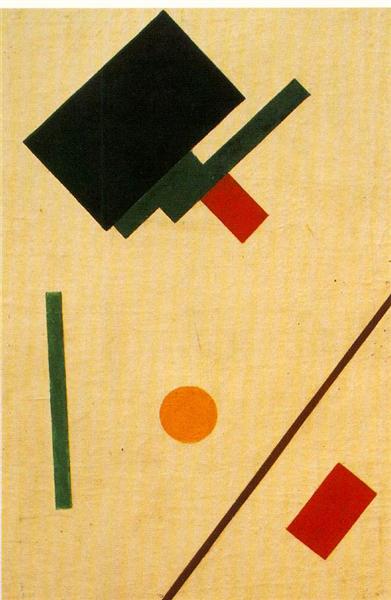Description
In the field of avant -garde art, the "supreme composition" of 1916 of Kazimir Malevich stands as a paradigm of pure abstraction and an immortal testimony of the suprematist movement. This particular work, as many of the same period and style of Malevich, raises a resolved renunciation of figurative representation and a firm emphasis on the expression of feeling through geometric shapes and color.
When observing the "suprematist composition", the first thing that attracts attention is its compositional simplicity, which, however, is loaded with deep intentions and meanings. The painting, executed on a white background, is composed of a constellation of geometric shapes: rectangles and inclined lines in different directions. The colors used, such as black, red and yellow, are intensely solid and contrast with each other, creating a visual dynamic that confers a feeling of balance within the apparent chaos.
This juxtaposition of shapes and colors is not random. Malevich, when developing suprematism, sought to transcend the limitations of representational art and penetrate a deeper and more spiritual reality. In one sense, his work is more an experience than an image. The disposition of the elements in the "suprematist composition" forces the viewer to reconsider the conventions of the form and space. The dispossession of any reference to tangible objects or human figures means that attention focuses exclusively on the interaction of colors and geometric shapes.
The white background deserves a special mention, since it is not simply an indifferent vacuum, but acts as a "zero space", an immaculate field from which the forms emerge, almost as in a cosmogonic creation process. The white here could be interpreted as the symbol of a new beginning or a blank board that invites a pure perception.
Kazimir Malevich, founder of suprematism, conceived this style as a means to achieve the supremacy of pure and not objective sensitivity. The "1916 suprematist composition" is a clear manifestation of this philosophy. Through his work, Malevich managed to strip the art of his imitative function and open a new spectrum of visual and emotional possibilities.
In the context of its production, this work is in a period of intense activity and artistic experimentation by Malevich. In 1915, he had presented the "Black Square", one of his most iconic works, and the "suprematist composition" can be seen as an extension and deepening of the principles exposed in that work. It is interesting to note that, although "supreme composition" may seem less radical than the "black square", it actually offers a visual and conceptual wealth that invites a more detained exploration.
"Supreme composition" is not limited to being a visual work of art; It is a challenge to perception, an invitation to explore beyond the tangible and a reflection on spirituality in modern art. Through this piece, Malevich not only changed the course of abstract art, but also the way we understand the purpose of art itself. It makes us clear that, in suprematism, what we see is only the beginning of a much deeper visual and emotional experience.
KUADROS ©, a famous paint on your wall.
Hand-made oil painting reproductions, with the quality of professional artists and the distinctive seal of KUADROS ©.
Art reproduction service with satisfaction guarantee. If you are not completely satisfied with the replica of your painting, we refund your money 100%.

